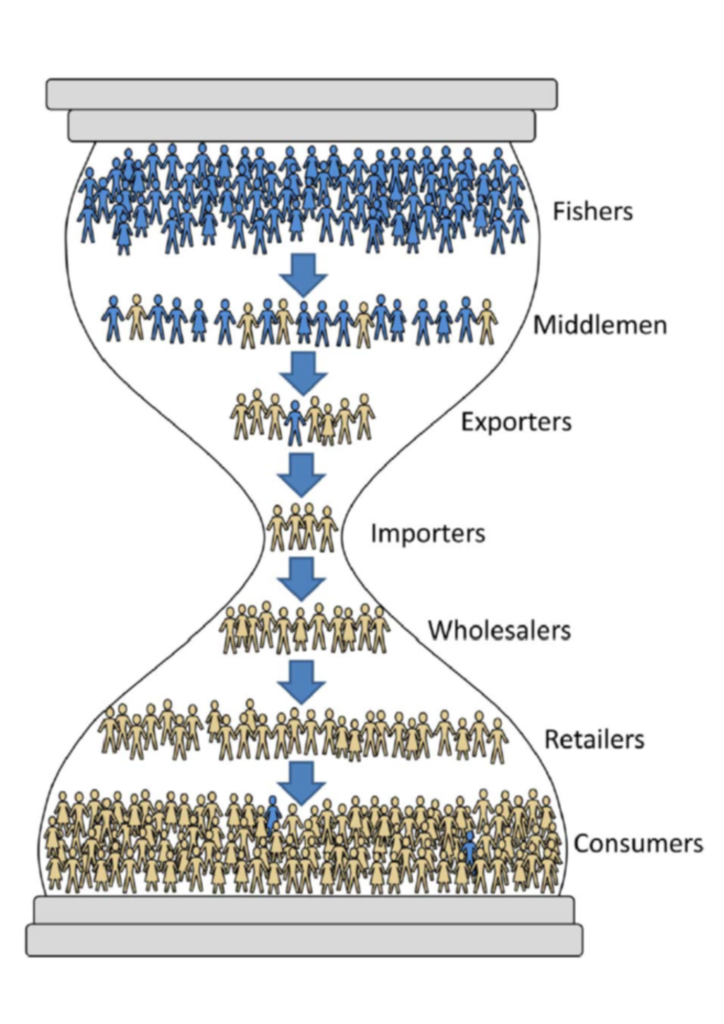#DemiLaut: The Pilot Program
Online Class
2. Modernising Traditional Fisheries: How are you making impact?
Learn about the initiatives that #DemiLaut is building. Understand the initiatives impact and vision. Explore and discover methods and approaches as changemakers to contribute to the ocean and its people.
Author / Compiled by
Haaziq I.
Sharmaine Kaur
Sofea Farida
Reviewed by
Dr. Siti Akmar Ab Rahim (UNIMAS)
2.1 The Fisher Economics
Every day, our traditional fishers go through a lot of hardships just to put food on the table for their families and to help them send their kids to school. They would always say: “as a fisher, my only hobby is to be at sea”. However, the ocean has changed quite a lot from when they had first begun fishing. They informed us that back in the days, they would swim underwater where they would see large schools of fishes swarming the ocean. With the change in the ocean today, they too knew, it’s uncertain on whether they would return home with catches, even after spending on the operational costs such as petrol and ice.
Let’s do some quick math. In general, a fisher would make about RM2,500.00 on average a month, working for 20 days monthly. They would spend about RM200.00 for ice and petrol daily. Their returns would be based on the volume and species variety of their catches. The faster way to profit is to sell these in bulk to middlemen and distributors, even if it means that they would earn 60% lesser than what is being sold in the market. The worst days for a fisher would mean that they may not have any catches at all. This would instill quite some fear in them if it prolongs from beginning of the month to the end of the month.
To a certain extent, this has made them believe that the more they catch, the more they would earn. However, the reality is not as it seems. The fact is, the more the fishers catch, the lesser they would earn per fish when selling in bulk. This fear and misconception then lead to having the fishers increase the rate of their catches to earn better, leading to overfishing.
With that said, we can only make a difference if we could change the paradigm whereby traditional fishers would earn better from reducing their rates of catches, as they could profit better from selective and sustainable fishing practises.
Fp = Mp - (CAPEX + OPEX)
Fp = Fishers Profit
Mp = Market Price of Catch
CAPEX = Capital Expenditures (i.e.: boats, nets, tools, etc)
OPEX = Operational Expenditures (i.e.: fuel & ice, etc)
2.2 Modernising Traditional Fishers
The traditional fishers are somehow motivated by the interest of the middlemen and distributors, who would earn based on the increase of rates, frequency and volume of catches. This practise leads to a push to catch more for lesser. And if this is the leanest option, it’ll continue to exhaust our fish stocks in the sea. What if we could have the middlemen and distributors working together instead to empower sustainable traditional fishers to effectively catch the right fish for the right market?

In DemiLaut, we believe that we could provide an alternative value to these fishers. What if instead we reduce the OPEX and CAPEX of traditional fishers, so they could earn more profit? How about we market the fish well with better processing and quality control, increasing the value? There are opportunities to explore with the fishers. And we’re hoping to explore and discover whether this is possible with the likes of you.
"Give a man a fish, We feed for a day,Teach a man to fish sustainably, We feed the society for a lifetime."
Fact Sheet
Sustainable fishing means leaving enough fish in the ocean, respecting habitats and ensuring people who depend on fishing can maintain their livelihoods. When you buy or sell sustainably-caught fishes, you are contributing to the change.
Steve Palumbi of Stanford University mentioned “Unless we fundamentally change the way we manage all the oceans species together, as working ecosystems, then this century is the last century of wild seafood.”
2.3 How would you be making the difference?
There is a number of possibilities and opportunities to help improve the traditional fishers’ livelihood while enabling them to be inclusive in managing overfishing and monitoring the impact of climate change on the ocean, per se. In this programme with you, we aim to test the idea of whether the fishers would want to use the product and services we provided, whether the public, in this case the youths, could benefit from the programme through contributing, learning and acknowledging, to profiting together with fishers – prioritising a sustainable fishing product and outcome.
We are looking into upskilling you as a changemaker, share you our point of view and iterate this process collectively to measure the outcome and impact in modernising traditional fisheries. We would digitize the fishers’ operations in note-taking their daily catches onto our tech-app, which will then be recorded into our system. There are opportunities to monetize the data for governance and commercial sake, however, it is vital for us to first measure the outcome at this scale. Further elaboration on the use of the tech-app will be done so in a later module.
What to consider when speaking to fishers?
1. Use the right sequence:
Provide an atmosphere that encourages fishers to speak freely.
Avoid leading questions and help to get the fishers to be interested in the objective.2. Ask the right way:
Avoid appearing superior or condescending.
Make use of familiar words.
If you can, speak in their native language.
3. Use the right technique:
Ask questions indirectly and informatively.
Keep it simple and focus on the goal of your engagement.